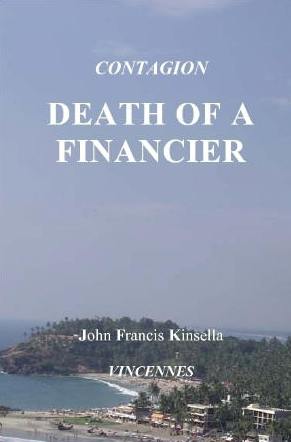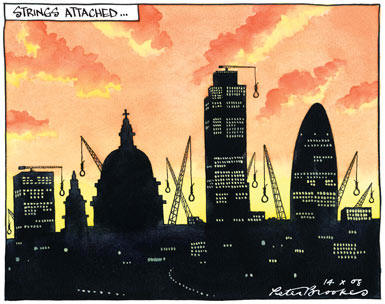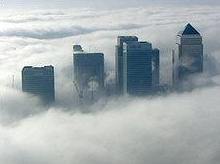|
|
 |
An independent view of the world
seen from Tokelau
The Independent New York Times
Tokelau, Saturday,
October 25,
2008 Weekend Edition, editor
- contact sumpinein@gmail.com
|
 |
|
|
|
|
GREENSPAN: I
WAS 'PARTIALLY' WRONG ON CREDIT CRISIS |
|
With this incredible
admission former Federal Reserve Chairman Alan
Greenspan told Congress on Thursday he was
"shocked" at the breakdown in U.S. credit
markets and said he was "partially" wrong to
have resisted regulating some securities.
Despite concerns he had in 2005 that risks were
being underestimated by investors, "this crisis,
however, has turned out to be much broader than
anything I could have imagined," Greenspan said
to the House of Representatives Committee on
Oversight and Government Reform. "Those of us
who have looked to the self-interest of lending
institutions to protect shareholder's equity
(myself especially) are in a state of shocked
disbelief," said Greenspan, who stepped down
from the Fed in 2006. While Greenspan was once
hailed as one of the most accomplished central
bankers in U.S. history, the low interest rates
during his final Fed years have now been blamed
for fuelling the housing bubble and the crash
that touched off the current financial crisis. |
|
 |
|
A UN study says that in financial
terms currently the loss of forest
equals some US$2 to US$5 trillion every
year. Who is going to do something about
all this? Indonesian authorities have pledged
to stop the loss of forests and species
in Sumatra, one of the world's most
ecologically important islands.
Representatives of the island's 10
provinces, national government and the
environment group WWF launched the deal
at the World Conservation Congress.
Sumatra has lost about half of its
forest cover in the last 20 years. It is
home to a number of important and iconic
species such as the tiger, orangutan,
rhinoceros and elephant. The island has
suffered floods and forest fires in
recent years that have been widely
attributed to illegal forest clearance.
Two years ago, President Susilo Bambang
Yudhoyono was forced to apologise to
Singapore and Malaysia when smog from
burning Sumatran forest covered the
neighbouring countries. The need to deal
with these issues appears to have played
a big part in persuading the authorities
to act. "In the rainy months, we are
seeing landslides and flooding more
often, and it is time to make a real
change," said Indonesia's deputy
environment minister Hermien Roosita at
a news briefing here. "Every governor
from the 10 provinces and four
(national) ministries have signed this
monumental commitment to ecosystem
restoration of the island and protecting
the remaining natural forest." More than
13% of the island's forests lie on peat,
which contain vast amounts of carbon
that would be lost to the atmosphere if
the trees were removed, accelerating
climate change. "When you look at the
flora and fauna in this area and the
rate of loss that's going on, this is a
substantial commitment to protect and
restore forests," said Gordon Shepherd,
WWF's director of global policy. The
government has already regulated to stop
clearance of virgin forest for palm oil
plantations - grown for food, industry
and biofuels - but the government
acknowledges the ban may not be
completely effective. |
|

|
Read DEATH OF A
FINANCIER by JOHN
FRANCIS KINSELLA |

|
Tom Barton, a City
mortgage broker, decides
to quit his business in
the wake of the subprime
crisis and arrives in
Kovalam, in the south of
India. In the Maharaja
Palace he finds himself
in the company of
holiday makers from the
UK, Scandinavia and
Russia. Stephen Parkly,
the CEO of a successful
City bank, and his young
wife Emma are taking a
well earned year end
break. Parkly falls
gravely ill with a
mysterious infection,
whilst back in the City,
unknown to him his
mortgage and investment
bank, West Mercian
Finance is in grave
difficulties. Ryan
Kavanagh, a doctor,
comes to Emma’s aid with
the help of Barton,
after an attempted
cover-up by the Indian
authorities, who fear
for their tourist
industry and more
especially medical
tourism, as the disease
threatens the resort
with the tourist season
in full swing. Thousands
of British tourists
enjoying the sun are
unaware of the pending
disaster, many are
equally unaware their
savings about are to be
wiped out in the West
Mercian collapse. |
|
Some are
still
spending.... |
|
|
|
|
McCAIN TRAILS OBAMA
IN FINAL DAYS |

|
Colin Powell’s
endorsement of
Obama is a
bitter blow to
McCain. It is
getting harder
and harder to
remember the
last time
anything
happened in
Campaign 2008
that John
McCain's camp
would regard as
clear,
unambiguous good
news. Colin
Powell once
tipped as a
presidential
candidate is the
latest leading
figure to
endorse the
presidential
candidate.
McCain has
struggled to
find the right
tone and the
right message
amid a sinking
economy, and
Sarah Palin has
come dangerously
close to running
aground in a
series of
excruciating
interviews on
network
television.
Opinion polls
have also
provided
depressing
evidence that
Barack Obama is
winning the
arguments and -
for the moment
at least -
winning the
election. |
|
|
|

|
The UK banks
have
traditionally
been net
borrowers in
the world
money
markets,
relying on
banks from
countries
like Japan
to provide
them with
the money
they need.
But the past
year has
seen Libor
rates soar
well above
the official
Bank of
England or
other
central bank
rates as
commercial
banks have
reined in
lending,
fearful that
they might
not get the
cash back.
As the money
markets have
dried up,
some of the
biggest
banks in the
UK have been
deprived of
the finances
they need
for their
day to day
activities.
This has in
turn forced
the banks to
withdraw
some of
their most
generous
products and
cut back on
the amounts
that they
lend to
their
customers.
|
|
|
DUBAI
TREMBLES |
 |
|
With
its kilometre high
project Dubai prides
itself on its shiny
image, something that
the city has spent the
last decade perfecting
and it is not about to
let all that hard work
go to waste, global
recession or not. So, if
anywhere can put a
positive spin on
economic meltdown, then
Dubai will have a good
go. So it was that while
the rest of the world
waited anxiously for
news on bank bailout
plans, Dubai announced
it would built the
world's tallest tower.
Dubai is anxious to
preserve its image of
opulence, whatever the
stocks say. As housing
prices were wobbling
elsewhere, the huge
annual property
exhibition reported
remaining busy and
potential investors were
encouraged by a survey
saying real estate
prices in the Middle
East will significantly
out perform all other
regions. No-one sensible
is now predicting the
continuation of the
exponential price
increases that have been
seen in Dubai since it
opened its property
market to foreigners,
but there is a belief
prices will continue to
rise more steadily - not
least because rents are
extortionate and the
increasing number of
people moving to the
city all need somewhere
to live. |
|
|
|

|
Bond's new adventure in
Quantum of Solace has
edgy close-ups of Daniel
Craig's granite features
give way to a spectacular
high-speed chase around an
Italian coastal road.
Bullets fly, glass
splinters, cars crunch, in a
scene that - like many of
the film's best - owes much
to the quick-fire editing of
the Bourne thrillers. By the
time the opening credits
come along, playing out to
Jack White and Alicia Keys's
punchy title song, you
realise you've barely
breathed for five minutes.
Thereafter, Craig's second
outing as the famous
so-called "spy" - actually,
when you think about it, an
assassin - turns out to be a
tale of revenge. And not for
the first time in the
franchise: Timothy Dalton
spent the whole of 1989's
Licence to Kill in pursuit
of the man who murdered the
wife of his CIA chum Felix
Leiter. In this much darker
film, picking up from where
Casino Royale left off, 007
finds himself after two
people: the man who fatally
betrayed Vesper Lynd, the
woman he loved; and Dominic
Greene (bullfrog-eyed
Mathieu Amalric), a big
player in the sinister
organisation that
blackmailed her, now
striking a shady deal in
some Bolivian desert. |
|
|
QUEEN LIZ VISITS GOOGLE |
 |
|
|
LAID
OFF TRADERS QUIT BANK |
|
|
|
|
|
WHO'S
GOING DOWN
THE TUBE |
 |
|
|
|
Andrew Lahde of Lahde Capital
Management says goodbye to suckers and flies off
into the sunset to live happily ever on his
870% capital gain |
 |
|
An
extraordinary letter to the Financial Times from
Andrew Lahde of Lahde Capital Management |
October 17, 2008
Today I write not to
gloat. Given the pain that nearly
everyone is experiencing, that would be
entirely inappropriate. Nor am I writing
to make further predictions, as most of
my forecasts in previous letters have
unfolded or are in the process of
unfolding. Instead, I am writing to say
goodbye.
Recently, on the front
page of Section C of the Wall Street
Journal, a hedge fund manager who was
also closing up shop (a $300 million
fund), was quoted as saying, “What I
have learned about the hedge fund
business is that I hate it.” I could not
agree more with that statement. I was in
this game for the money. The low hanging
fruit, i.e. idiots whose parents paid
for prep school, Yale, and then the
Harvard MBA, was there for the taking.
These people who were (often) truly not
worthy of the education they received
(or supposedly received) rose to the top
of companies such as AIG, Bear Stearns
and Lehman Brothers and all levels of
our government. All of this behavior
supporting the Aristocracy only ended up
making it easier for me to find people
stupid enough to take the other side of
my trades. God bless America.
There are far too many
people for me to sincerely thank for my
success. However, I do not want to sound
like a Hollywood actor accepting an
award. The money was reward enough.
Furthermore, the endless list of those
deserving thanks know who they are.

I will no longer
manage money for other people or
institutions. I have enough of my own
wealth to manage. Some people, who think
they have arrived at a reasonable
estimate of my net worth, might be
surprised that I would call it quits
with such a small war chest. That is
fine; I am content with my rewards.
Moreover, I will let others try to amass
nine, ten or eleven figure net worths.
Meanwhile, their lives suck.
Appointments back to back, booked solid
for the next three months, they
lookforward to their two week vacation
in January during which they will likely
be glued to their Blackberries or other
such devices. What is the point? They
will all be forgotten in fifty years
anyway. Steve Balmer, Steven Cohen, and
Larry Ellison will all be forgotten. I
do not understand the legacy thing.
Nearly everyone will be forgotten. Give
up on leaving your mark. Throw the
Blackberry away and enjoy life.
So this is it. With
all due respect, I am dropping out.
Please do not expect any type of reply
to emails or voicemails within normal
time frames or at all. Andy Springer and
his company will be handling the
dissolution of the fund. And don’t worry
about my employees, they were always
employed by Mr. Springer’s company and
only one (who has been well-rewarded)
will lose his job.
I have no interest in
any deals in which anyone would like me
to participate. I truly do not have a
strong opinion about any market right
now, other than to say that things will
continue to get worse for some time,
probably years. I am content sitting on
the sidelines and waiting. After all,
sitting and waiting is how we made money
from the subprime debacle. I now have
time to repair my health, which was
destroyed by the stress I layered onto
myself over the past two years, as well
as my entire life – where I had to
compete for spaces in universities and
graduate schools, jobs and assets under
management – with those who had all the
advantages (rich parents) that I did
not. May meritocracy be part of a new
form of government, which needs to be
established.
On the issue of the
U.S. Government, I would like to make a
modest proposal. First, I point out the
obvious flaws, whereby legislation was
repeatedly brought forth to Congress
over the past eight years, which would
have reigned in the predatory lending
practices of now mostly defunct
institutions. These institutions
regularly filled the coffers of both
parties in return for voting down all of
this legislation designed to protect the
common citizen. This is an outrage, yet
no one seems to know or care about it.
Since Thomas Jefferson and Adam Smith
passed, I would argue that there has
been a dearth of worthy philosophers in
this country, at least ones focused on
improving government. Capitalism worked
for two hundred years, but times change,
and systems become corrupt. George Soros,
a man of staggering wealth, has stated
that he would like to be remembered as a
philosopher. My suggestion is that this
great man start and sponsor a forum for
great minds to come together to create a
new system of government that truly
represents the common man’s interest,
while at the same time creating rewards
great enough to attract the best and
brightest minds to serve in government
roles without having to rely on
corruption to further their interests or
lifestyles. This forum could be similar
to the one used to create the operating
system, Linux, which competes with
Microsoft’s near monopoly. I believe
there is an answer, but for now the
system is clearly broken.

Lastly, while I still
have an audience, I would like to bring
attention to an alternative food and
energy source. You won’t see it included
in BP’s, “Feel good. We are working on
sustainable solutions,” television
commercials, nor is it mentioned in
ADM’s similar commercials. But hemp has
been used for at least 5,000 years for
cloth and food, as well as just about
everything that is produced from
petroleum products. Hemp is not
marijuana and vice versa. Hemp is
the male plant and it grows like a weed,
hence the slang term. The original
American flag was made of hemp fiber and
our Constitution was printed on paper
made of hemp. It was used as recently as
World War II by the U.S. Government, and
then promptly made illegal after the war
was won. At a time when rhetoric is
flying about becoming more
self-sufficient in terms of energy, why
is it illegal to grow this plant in this
country? Ah, the female. The evil female
plant – marijuana. It gets you high, it
makes you laugh, it does not produce a
hangover. Unlike alcohol, it does not
result in bar fights or wife beating.
So, why is this innocuous plant illegal?
Is it a gateway drug? No, that would be
alcohol, which is so heavily advertised
in this country. My only conclusion as
to why it is illegal, is that Corporate
America, which owns Congress, would
rather sell you Paxil, Zoloft, Xanax and
other addictive drugs, than allow you to
grow a plant in your home without some
of the profits going into their coffers.
This policy is ludicrous. It has surely
contributed to our dependency on foreign
energy sources. Our policies have other
countries literally laughing at our
stupidity, most notably Canada, as well
as several European nations (both
Eastern and Western). You would not know
this by paying attention to U.S. media
sources though, as they tend not to
elaborate on who is laughing at the
United States this week. Please people,
let’s stop the rhetoric and start
thinking about how we can truly become
self-sufficient.
With that I say
goodbye and good luck.
All the best,
Andrew Lahde
|
|
|
|
|
Since food prices began to rise
100 million more people have been pushed into poverty,
according to the World Bank, with as many as two billion
on the verge of disaster. Almost half the world's
population, let's remember, live on less than $2.50 per
day. Millions die annually of hunger and starvation, and
more than a billion do not have access to fresh water. |
With the world financial crisis
these numbers are poised to rise dramatically with
population growth, dwindling natural resources and
higher consumer prices across all goods and services. So
as the stock market tumbles and the world economy
falters, it's important to remember that it's more than
financial losses we are talking about, it's the loss of
life. |
|
|






















